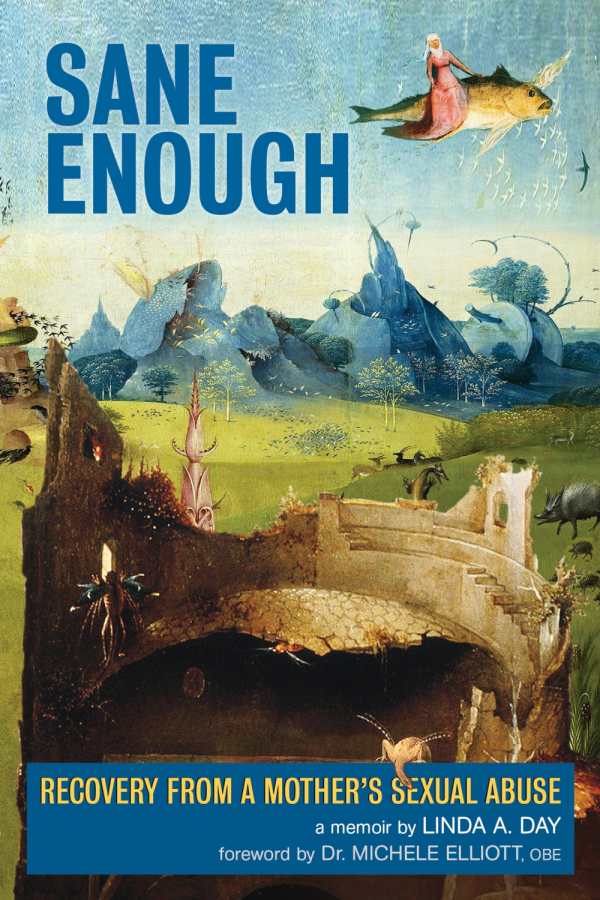
Sane Enough
Recovery From a Mother's Sexual Abuse
- 2015 INDIES Winner
- Bronze, LGBT (Adult Nonfiction)
Sane Enough is a challenging, insightful, and rare work that offers poignant insights into what it’s like to survive childhood sexual abuse.
From award-winning freelance writer Linda Day comes a psychologically challenging memoir almost two decades in the making. Sane Enough is the unflinching account of one woman’s struggle to grow into herself while also suppressing memories of childhood abuse.
Linda’s earliest memories, with a few warm exceptions, are dominated by a sense of wrongness. She feels unloved, unwanted, unbeautiful, and far from understood, sensibilities that are not lessened by her mother’s coldness or her father’s distance. Despite her discomfort, she grows into a successful young woman, studying science at Rice University, and meeting and marrying an accomplished classmate, Geoff.
But the idyll devolves into playacting. As Linda struggles to free herself from a relationship devoid of intimacy, unexpected desires arise, particularly concerning the women in her life to whom she wishes to be closer. Ruptures force her to confront her feelings: Is she a lesbian? Does she really want love? Why does sex always feel so wrong?
Day’s story involves a host of complicated figures: therapists whose inattention and impropriety bleed into abuse territory; sexual partners who are both frustrated by and manipulative regarding her hang-ups when it comes to physicality; and perennial and dark figures, particularly members of her family who, she comes to find, are at the root of her dysfunction. Day draws from diaries and old letters to flesh out these characters, and punctuates her memories with psychological insights, naming codependency and manipulation as they arise, even if such understandings did not occur to her until years later.
The ultimate villain in this memoir is Day’s mother, who, Day comes to understand, abused both Linda and her sister throughout their early childhood years. Memories are revived in the course of rigorous therapy—though they come of their own volition, almost despite one particularly inept therapist—memories of inappropriate touching, of inculcated shame around body parts, of needing and aching, of being denied and punished. Day struggles throughout the memoir to reconcile these horrors to the mother who often appears before her: growing frail, and with no inclination to confirm the stories.
Day’s work is self-aware, her prose elegant and her familiarity with the nuances of the subject apparent. Some moments will sear their ways into the consciousness. Day’s mother, near the end of her life, declares “I’m your mother! I can touch you anywhere I want!” but without affording Day a full confession.
The tactile nature of Day’s scene setting makes such moments all the more devastating: A glossy seashell. Gelatinous skin. Smells both off-putting and inviting. Painful realities are made more real under such attention. Moreover, Day’s willingness to give room to those who doubt her—who read her manuscript and accused her of invention, who chalked her memories up to false implants—brings into relief the fraught nature of abuse revelations.
This is a hard and honest book to work through, but its pages constitute a valuable entry into more open discussions of childhood sexual abuse. Day offers means of support to readers who share her suspicions, and the naked nature of her recollections may inspire others toward similar acts of bravery. Sane Enough is a challenging, insightful, and rare work that offers poignant insights into what it’s like to survive childhood sexual abuse.
Reviewed by
Michelle Anne Schingler
Disclosure: This article is not an endorsement, but a review. The publisher of this book provided free copies of the book and paid a small fee to have their book reviewed by a professional reviewer. Foreword Reviews and Clarion Reviews make no guarantee that the publisher will receive a positive review. Foreword Magazine, Inc. is disclosing this in accordance with the Federal Trade Commission’s 16 CFR, Part 255.
